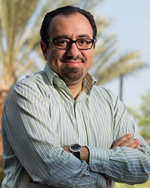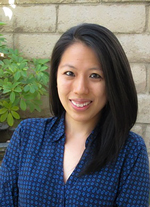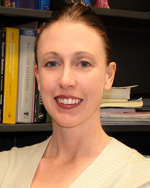


Archana McEligot, Ph.D., is an epidemiologist and professor of Health Science at California State University, Fullerton. Dr. McEligot received her PhD in Public Health Epidemiology from the joint doctoral program between UCSD and SDSU. Dr. McEligot’s primary research interests include examination of the association between dietary intakes and chronic disease control and prevention, specifically cancer, in at-risk populations. Also, she is interested in assessing the relationship between dietary circulating biomarkers, such as folate and carotenoids in conjunction with genetic polymorphisms on disease risk via population-based, large cohort studies. Further, through strong interest, and the support of nationally recognized, externally funded grants, Dr. McEligot has developed curricula, guided students through research, and directs training programs in efforts to support the success of underrepresented students. She serves as the director and principle investigator (PI) of BD3-REAP.

Math Cuajungco, Ph.D., M.S.c., earned his doctorate in Neuroscience from the University of Auckland, New Zealand in 1999. Part of his PhD thesis work was undertaken at Harvard Medical School as a pre-doctoral scholar, where he investigated the effects of abnormal zinc metabolism in the brain, and the role of zinc, copper, and iron in Alzheimer's disease pathology. In 2000, he began his post-doctoral work at Harvard (Massachusetts General Hospital), where he studied a rare genetic disease known as familial dysautonomia (a sensory neuropathy). He then moved to another lab to study the sensory system and molecular players involved in hearing at Harvard (Massachusetts Eye and Ear Infirmary), and at Stanford University School of Medicine. His investigations focused on TRPV4 and TRPML3 ion channels, both of which belong to the superfamily of membrane channels known as the transient receptor potential (TRP). The TRP ion channels are known to mediate signal transduction processes in response to various sensory stimuli in an organism. His current research interests include the TRPML ion channel subfamily, transmembrane (TMEM-163, 176A and 176B) proteins, and the cellular zinc transport system. Dr. Cuajungco is co-PI on the BD3-REAP NIH Grant.

Sam Behseta, Ph.D., M.S., received his PhD in statistics from Carnegie Mellon University in 2003. Behseta is a Fellow of the American Statistical Association. His main area of research is statistical modeling of neuronal spike train data. He is currently serving as the director of Center for Computational and Applied Mathematics (CCAM) at the College of Natural Sciences and Mathematics (NSM). Behseta has mentored 32 undergraduate research students at Cal State. He is an associate editor of Journal of the American Statistical Association and American Statistician, the flagship journals of The American Statistical Association (ASA). He also served as the Executive Editor of CHANCE, the magazine of ASA during 2011-14. Dr. Behseta has research interests in Bayesian statistics, statistics in neuroscience, modeling epidemiological data, foundations and history of statistics, statistics education, probabilistic watermarking, and epidemiology. Behseta is the recipient of the Outstanding Research Award at the NSM in 2014, and one of the co- PIs on the BD3-REAP NIH Grant.

Laura Chandler, Dr.PH., M.P.H., is an assistant professor in the Department of Health Science at California State University, Fullerton. She holds a Doctorate in Public Health with an emphasis in Health Education & Promotion and has been working and teaching in the field for 16 years. Dr. Laura Chandler’s research interests include adolescent and college health issues. She is particularly interested in the development and implementation of innovative strategies to address healthy eating and physical activity among college students. Dr. Chandler is a member of the American Public Health Association (APHA) and the Society of Public Health Educators (SOPHE). She has also served as the advisor of the CSUF Department of Health Science for 7 years (2004-2011). Dr. Chandler provides future pathways and advising for the BD3-REAP students by providing experience, guidance, and motivation necessary to prepare students for futures in graduate programs.

Sinjini Mitra, Ph.D., is currently an Associate Professor at the Department of Information Systems and Decision Sciences in the Steven G. Mihaylo College of Business and Economics at California State University, Fullerton. Prior to joining Cal State Fullerton, she was a Postdoctoral Research Associate at the University of Southern California’s Information Sciences Institute (USC-ISI), and a Postdoctoral Research Associate at the Department of Statistics and CyLab at Carnegie Mellon University. Dr. Mitra received her B.Sc. degree from Presidency College, Calcutta, India (Major: Statistics), M.Stat. degree from the Indian Statistical Institute, India, and Ph.D. degree in Statistics from Carnegie Mellon University, Pittsburgh, USA. Dr. Mitra’s research is interdisciplinary and primary interests include data mining and business analytics, biometric authentication and security-related topics, and statistical methodologies for data analysis, modeling and inference in education, healthcare and information systems. She has recently published an edited book with CRC Press, Chapman & Hall, called “Biometrics in a Data driven world: Trends, Technologies and Challenges”. Her teaching interests include Business Statistics, Data Mining, and Analytics. Dr. Mitra conducts student learning and content assessments for the students exposed to Big Data science (BDs) integrated curricula, and conducts research on the topics of big data in healthcare and biomedical sciences.

Shana Charles, M.P.P., Ph.D., joined the CSUF Department of Health Science as an Assistant Professor in 2015, after six years as Director of Health Insurance Studies and nine years as a Senior Research Associate at the UCLA Center for Health Policy Research. Dr. Charles's research focuses on health insurance, particularly among low-income children, and its impact on access to care, and underinsurance among those with coverage. She also specializes in political issues surrounding health care reform at both the state and the national levels. Her most recent work includes an examination of the differences of access to care between Medi-Cal enrollees and those with private health insurance; an evaluation of county-level outreach and enrollment methods under the Affordable Care Act; and a study of the Affordable Care Act health insurance expansions in California and their impact on access and utilization. Dr. Charles regularly appears on numerous NPR and other talk radio programs to discuss health care reform issues and their impact, including Air Talk, Press Play, and Take Two. Her work has received national media attention, including NBC Nightly News, The New York Times, the Wall Street Journal, and Politico.com. Dr. Charles will mentor and supervise three students during the supplement period as they assess, explore, clean, analyze, and present on Big Data in large health services datasets, focusing on the California Health Interview Survey.

Pimbucha Rusmevichientong, Ph.D., is an assistant professor in the Department of Health Sciences at California State University, Fullerton. She received her doctorate degree in Applied Economics from Cornell University in 2015. Her research interests primarily lie in the areas of applied microeconomics, experimental, behavioral and health economics, and more specifically, empirical analysis of behavioral health determinants, food demand system estimation and public policy on health outcome. In her research, Dr. Rusmevichientong applies economics concepts and quantitative research methods to understand real-world health situations particularly on obesity, malnutrition, smoking, impacts of food labeling, food advertising and anti-obesity advertising on eating behaviors, food calorie misperception, food policy intervention to improve health outcome via changing economic incentives or creating behavioral nudges. She will mentor three students during the supplement period as they learn to manage, analyze, and research Big Data via the NHANES data set.

Parvin Shahrestani, Ph.D., obtained her Ph.D. in Biology from the University of California, Irvine, and completed a post-doctoral fellowship in population genetics at Cornell University. In Fall 2015, she joined the faculty of California State University, Fullerton. The goals of her research group are to: (1) identify genes affecting health-relevant traits, specifically aging and immune defense, and (2) elucidate the dynamics of short-term adaptive evolution, in particular soft sweeps. Theory, experimental-evolution, whole-genome sequence analyses, and molecular genetics are used to study the evolution of health-relevant traits on the levels of phenotype, single-locus, and whole-genome using the fruit fly model system. Fruit flies have short generation times, which allow undergraduate and Masters students to see evolution experiments through from beginning to end.

Alice Lee, Ph.D., received her Master’s in Public Health as well as her doctoral degree in Epidemiology from the University of Southern California Keck School of Medicine. Her research interests primarily lie in the hormonal etiology and epidemiology of ovarian and breast cancer. Using both classic epidemiologic approaches and gene-environment interaction methods, Alice has explored the genetics of ovarian cancer as well as the impact of postmenopausal hormone therapy using multi-site data from the Ovarian Cancer Association Consortium (OCAC), an international collaboration that she has been actively involved in over the past several years. Her work has been published in peer-reviewed journals including Obstetrics and Gynecology, International Journal of Cancer, and Fertility and Sterility.

Valerie Poynor, Ph.D., is currently an Assistant Professor in the Mathematics Department at California State University, Fullerton. She obtained her PhD at the University of California Santa Cruz under the supervision of Athanasios Kottas, Ph.D. The focus of Dr. Poynor's dissertation was on Bayesian nonparametric modeling and inference for the mean residual life function in survival analysis. She later went on to work as Postdoctoral researcher at the Southwest Fisheries Science Center under the CSTAR (Center for Stock Assessment Research) program in Santa Cruz. She worked under Stephan Munch and Marc Mangel on combining Bayesian nonparametric methods and stochastic optimization for fisheries management. Dr. Poynor's research interests include Bayesian nonparametric modeling with application in survival analysis, fisheries management/ecology, and neuronal data analysis.

Koren Fisher, Ph.D., joined the faculty in the Department of Kinesiology in 2014. She earned bachelor’s degrees in Physical Education (B.P.E.) and Education (B.Ed.) at the University of Calgary, during which time she also attained her Level 3 figure skating coaching qualifications through Skate Canada and the National Coaching Certification Program in Canada. Dr. Fisher completed her M.Sc. degree in Kinesiology and Health Science at York University in Toronto, Ontario, where she specialized in fitness assessment and physiological monitoring in clinical, sport, and occupational environments. She went on to earn her Ph.D. at the University of Saskatchewan, where she examined the longitudinal relationships between physical activity, functional fitness, and health services utilization in older adults. Throughout graduate school, Dr. Fisher also coached recreational and competitive figure skating skaters in Saskatchewan.

Allyson Fry-Petit, Ph.D., obtained her Bachelor of Arts in Chemistry and Critical Thought and Inquiry from William Jewell College in Liberty, Missouri. She obtained her PhD in Inorganic Chemistry from The Ohio State University in Columbus, Ohio advised by Dr. Patrick Woodward. Fry-Petit's graduate work focused on controlling the ordering of the polar building units MO3F3 (M=Mo, W). She then went to Johns Hopkins University in Baltimore, Maryland to be a Postdoctoral Research Associate in the lab of Dr. Tyrel McQueen. There she focused the majority of her work on the development and use of dynamic pair distribution function (DPDF) analysis.

Veronica Jimenez Ortiz, Ph.D., obtained her doctorate at the University of Chile, Santiago, Chile. Her research areas include: the role of ion channels in sensing and adaptation to environmental conditions in protozoan parasites, mechanosensation, and electrophysiology.